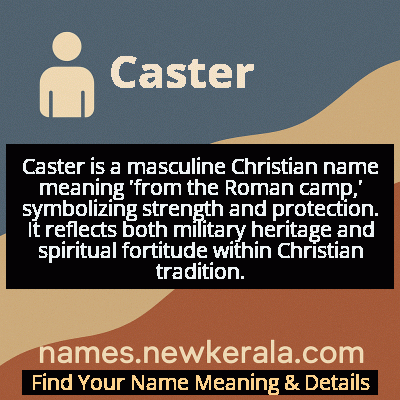Caster Name Meaning & Details
Origin, Popularity, Numerology Analysis & Name Meaning of Caster
Discover the origin, meaning, and cultural significance of the name CASTER. Delve into its historical roots and explore the lasting impact it has had on communities and traditions.
Name
Caster
Gender
Male
Origin
Christian
Lucky Number
3
Meaning of the Name - Caster
Caster is a masculine Christian name meaning 'from the Roman camp,' symbolizing strength and protection. It reflects both military heritage and spiritual fortitude within Christian tradition.
Caster - Complete Numerology Analysis
Your Numerology Number
Based on Pythagorean Numerology System
Ruling Planet
Jupiter
Positive Nature
Optimistic, inspirational, and creative.
Negative Traits
Scattered, exaggerating.
Lucky Colours
Yellow, gold, purple.
Lucky Days
Thursday.
Lucky Stones
Yellow sapphire.
Harmony Numbers
1, 2, 9.
Best Suited Professions
Arts, writing, communication.
What People Like About You
Creativity, optimism.
Famous People Named Caster
Caster Semenya
Olympic Athlete
South African middle-distance runner and two-time Olympic gold medalist in the 800 meters
Caster Troy
Fictional Character
Notorious criminal character portrayed by Nicolas Cage in the film 'Face/Off'
Caster Goodchild
Religious Figure
Methodist preacher and missionary known for his evangelical work in rural England
Name Variations & International Equivalents
Click on blue names to explore their detailed meanings. Gray names with will be available soon.
Cultural & Historical Significance
During the medieval period, the name evolved to represent both physical fortifications and spiritual strongholds, with several saints and religious figures bearing variations of the name. The Christian adoption of Caster transformed its meaning from purely military to include spiritual protection and community leadership. This dual significance made it appealing to families seeking names that conveyed both strength and religious devotion, particularly in regions with strong Roman historical influences.
Extended Personality Analysis
Individuals named Caster are often perceived as natural leaders with strong protective instincts, reflecting the name's military origins. They tend to be strategic thinkers who approach challenges with careful planning and organization, much like Roman commanders establishing fortified positions. Their personality typically combines practical problem-solving skills with a steadfast determination, making them reliable in crisis situations and valued for their ability to create stability in uncertain circumstances.
Socially, Casters often exhibit loyalty to their community or group, embodying the camp mentality of collective security and mutual support. They may display reserved confidence rather than overt assertiveness, preferring to lead through competence rather than charisma. Their protective nature extends to personal relationships, where they often take on guardian roles for friends and family. This combination of strategic thinking and protective loyalty makes them particularly effective in roles requiring both planning and interpersonal reliability.
Modern Usage & Popularity
In contemporary times, Caster remains a relatively uncommon but distinctive name choice, particularly favored by parents seeking names with historical depth and strong masculine connotations. Its usage has seen modest increases in recent decades, partly influenced by the fame of Olympic athlete Caster Semenya, though it remains outside the top 1000 names in most English-speaking countries. The name appeals particularly to families with interest in classical history, military heritage, or seeking alternatives to more common biblical names while maintaining Christian significance through its saintly associations.
Symbolic & Spiritual Meanings
Symbolically, Caster represents the concept of the fortress - both physical and spiritual. It embodies protection, security, and the establishment of safe boundaries. The name carries connotations of strategic positioning, reflecting the Roman military practice of carefully choosing camp locations for both defense and resource access. Metaphorically, it suggests someone who creates order from chaos, establishes foundations, and provides shelter for others. In Christian symbolism, it transforms into representing the soul as a fortress of faith, with the individual serving as both protector and protected within their spiritual community.

